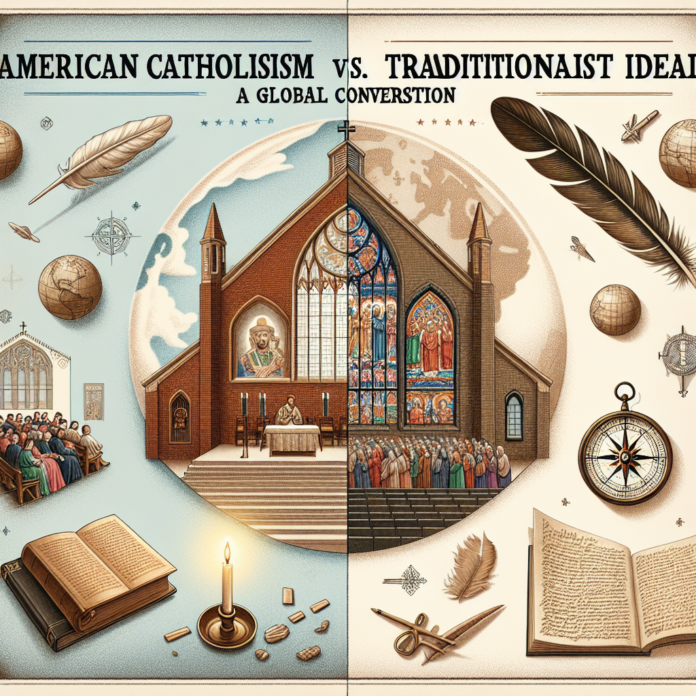American Catholicism has, over the past several decades, found itself at the heart of a vibrant and ongoing dialogue about faith, practice, and community. This conversation often juxtaposes the progressive values espoused by many within the contemporary Church against the traditional ideals upheld by a vocal minority. A critical examination of these contrasting perspectives reveals deeper insights into the evolving face of Catholicism.
One key figure who embodies the progressive values of modern Catholicism is Pope Francis. Elected to the papacy in 2013, Pope Francis has continually emphasized inclusivity, simplicity, and a return to the fundamental teachings of Christ. His papacy signals a departure from some of the more rigid interpretations of doctrine that characterized previous administrations, inviting a renewed sense of openness and adaptability into the faith.
Historically, the Catholic Church has experienced numerous reforms. The Second Vatican Council (1962-1965), or Vatican II as it is commonly known, marked a pivotal moment in the Church’s history. This ecumenical council sought to address relations between the Church and the modern world, ultimately resulting in profound changes in liturgy and practice, such as the allowance of the vernacular in Mass and increased lay participation. Traditionalists, however, have often viewed these reforms with suspicion, longing instead for the perceived purity of pre-Vatican II practices.
The traditionalist perspective finds expression in the modern-day enthusiasm for the Latin Mass, or the Tridentine Mass. This form of worship, conducted entirely in Latin and characterized by a stricter adherence to ritual, has seen a resurgence among certain groups within the Church. Proponents argue that it maintains a sacredness and continuity with centuries of Catholic history. However, critics suggest that an exclusive focus on the Latin Mass can foster an insular and exclusionary culture, alienating those who yearn for a Church that is more engaged with contemporary issues and more accessible to diverse congregations.
In comparison, American Catholicism under Pope Francis’s influence demonstrates a dynamic approach. Pope Francis’s teachings resonate particularly strongly in the United States, where the Catholic Church must navigate a complex social landscape. Issues such as immigration, social justice, and climate change are prominent on the American agenda, and the progressive stance taken by Pope Francis aligns closely with the concerns of many American Catholics. His advocacy for the poor, the marginalized, and the planet underscores an inclusive vision of the Church’s role in the world.
While traditionalist Catholics often point to a supposed moral decay brought about by progressive changes, an examination of the broader history of Catholicism reveals a different narrative. The moral authority of the Church has been compromised not by modern reforms but by failures to address internal crises, such as the clergy abuse scandals. Pope Francis’s efforts to confront these issues head-on signal an important move towards greater transparency and accountability—values that resonate powerfully in a world increasingly skeptical of opaque institutions.
Still, the appeal of traditionalism persists in some quarters. This can be attributed partly to a broader cultural phenomenon known as conservative nostalgia—a yearning for a perceived golden age of purity and certainty. This sentiment is visible not only in matters of faith but also in the political and social realms, where it often manifests as resistance to change and an idealization of the past.
However, the forward-looking vision seen in much of American Catholicism reflects a more robust and adaptable faith. It recognizes that tradition and progress are not mutually exclusive but are instead part of a continuum in which the Church can grow and respond to the needs of its people. For instance, initiatives like the Synod on the Family and the emphasis on pastoral care show how the Church can remain grounded in its core teachings while still addressing contemporary issues with compassion and relevance.
Moreover, the diversity within American Catholicism aligns well with the universal call for inclusivity championed by Pope Francis. The United States is home to a richly varied Catholic population, including significant communities of Latino, African American, Asian, and immigrant Catholics. These groups bring their own cultural perspectives and challenges, enriching the American Catholic experience. They also underscore the necessity of a Church that embraces a plurality of voices and experiences, something that is often stifled by traditionalist exclusivity.
In conclusion, the debate between American Catholicism and traditionalist ideals represents more than a simple dichotomy between old and new; it reflects deeper questions about the nature of faith, community, and the Church’s role in the modern world. While the allure of traditionalism offers a retreat into the familiar and the seemingly unchanging, the future of Catholicism—as embodied by the progressive values of Pope Francis—promises a faith that is vibrant, inclusive, and deeply attuned to the needs of its people. This approach not only aligns with the foundational teachings of compassion and service but also equips the Church to meet the challenges of a rapidly changing world with grace and adaptability.
